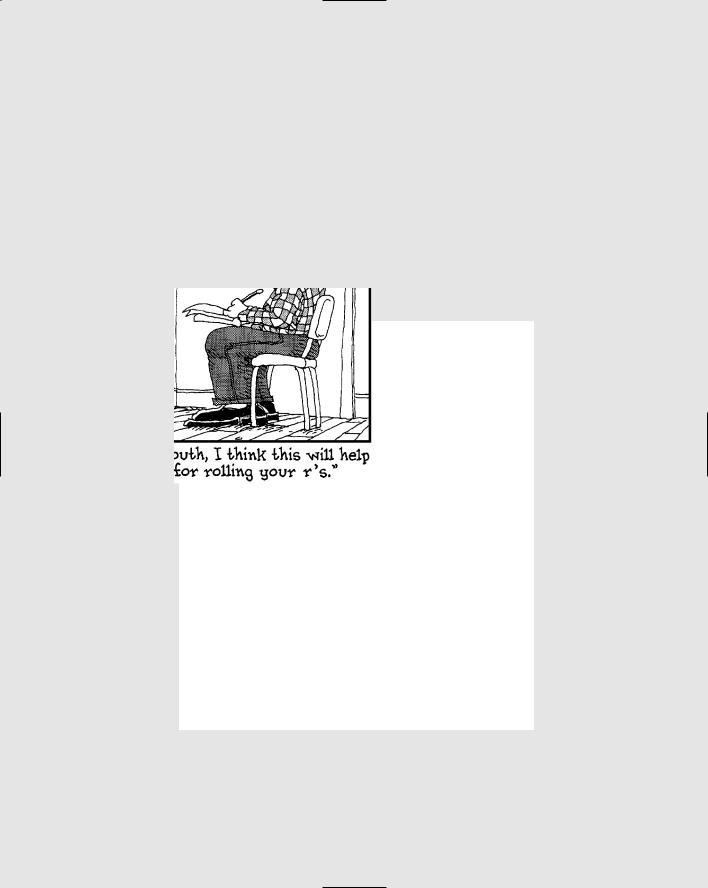
Russian For Dummies
.pdf
4Russian For Dummies
sports, reading, and other hobbies (Chapter 8). Chapter 9 equips you with the necessary phrases to make phone calls and send mail. For navigation through serious situations like getting a job or finding an apartment, refer to Chapter 10.
Part III: Russian on the Go
This part covers all the aspects of traveling, from planning your trip (Chapter 11) and discussing transportation (Chapter 12), to arranging for a place to stay (Chapter 13) and settling your financial matters (Chapter 14). Chapter 15 also shows you how to ask for directions, and Chapter 16 prepares you for handling emergencies.
Part IV: The Part of Tens
The Part of Tens is an unusual part of this book; it gives you lists of fun things to know, such as ten ways to pick up Russian quickly, ten holidays that Russians celebrate, and ten things never to do or say in Russia or to Russians. This part is also the place to find ten favorite Russian expressions and to pick up ten phrases that make you sound authentically Russian.
Part V: Appendixes
Russian For Dummies also includes four appendixes, which bring together some useful information. In Appendix A, find Russian verb tables. Appendix B is a convenient mini-dictionary for your quick reference. Appendix C offers the answer key to the Fun & Games sections of each chapter. And Appendix D helps you navigate through the attached audio CD; it contains the description of all the dialogues on the CD and tells you in which chapter you can find the text of the dialogue.
Icons Used in This Book
For your convenience, we marked some information in this book with special icons. Check out this guide to the icons, and the next time you see one of them, you’ll know what to expect!
This icon indicates which Talkin’ the Talk dialogues are included on the audio CD that comes with this book. This CD allows you not only to read but also to hear real conversational Russian.

Introduction 5
From famous Russian writers to a polite way to decline an invitation, this icon marks a wide variety of curious and useful facts about Russian culture.
If you’re curious about how the Russian language works, and if you want to expand your command of Russian to the extent of making up your own phrases, these bits of grammatical information may be of interest to you.
This icon points out some important information about Russian that’s worth remembering.
This icon signals a useful bit of information that can make life easier for you, whether it’s a handy way to remember a useful word or an insider’s advice on how to better handle a certain situation.
This icon attracts your attention to something you need to know to avoid a common mistake.
Where to Go from Here
Now that you’re familiar with the anatomy of Russian For Dummies, you can embark on your journey. You can start anywhere, and you don’t have to go in a specific order. Just choose a topic that seems appealing, find the corresponding chapter in the table of contents, and start speaking Russian!
If you’re at a loss about where to start, Chapter 2 may be a good place to get a grasp of the essentials of Russian grammar. Another good starting point is Chapter 1, which quickly boosts your confidence by pointing out all the Russian words you already know. Or, you can go straight to the sections that deal with something you need urgently: Ordering ice cream is covered in Chapter 5, for example.
Wherever you decide to start, you can find plenty of useful phrases to get you speaking Russian and exploring the benefits that your language skill brings. And now we wish you Schastlivogo puti! (shees-lee-vuh-vuh poo-tee; bon voyage!)

6Russian For Dummies

Part I
Getting Started

In this part . . .
Part I is the beginning of your exciting journey. Here you get the essential information you need to take you through the rest of the book. Chapter 1 puts you at
ease as you breeze through the Russian alphabet and discover that you actually already know quite a few Russian words. Chapter 2 gives you the basics of Russian grammar, which you may want to refer to throughout the rest of the book. And in Chapter 3, you start putting your newfound knowledge to work right away with popular greetings and introductions in Russian. So, get ready to start speaking po-russki (pah roos-kee; Russian)!

Chapter 1
You Already Know a Little Russian
In This Chapter
Getting a grip on Russian words you know
Understanding the Russian alphabet
Pronouncing words properly
Discovering popular expressions
Reading Russian with confidence
Welcome to Russian! Whether you want to read a Russian menu, enjoy Russian music, or just chat it up with your Russian friends, this is the beginning of your journey. In this chapter, trust your eyes, ears, and intuition,
and you quickly discover that Russian isn’t that hard after all. When you’re done with this chapter, you’ll be able to recognize all the letters of the Russian alphabet, discover the basic rules of Russian pronunciation, and be able to say some popular Russian expressions and idioms.
Scoping Out Similarities between English and Russian
You may be surprised to find out that English and Russian are very distant relatives. They both come from the same ancestor — Sanskrit — and both belong to the same family of Indo-European languages. The similarities don’t stop there. If you know English, you already know many Russian words.
In this section, you discover Russian words that are already part of English, and you find out about Russian words that have the same meaning and pronunciation as their English counterparts. We also warn you about a few words that sound similar in both languages but have very different meanings.

10 |
Part I: Getting Started |
Identifying Russian words in English
As the world becomes more and more international, languages and cultures are constantly borrowing from and lending to one another, and Russian is no exception. Many Russian words that now appear in English either describe food and drinks or came into use during important historical periods.
Eating and drinking up
If you drink vodka, then you can already speak some Russian, because the word, like the drink, came from Russia. Maybe you can even rattle off the differences between Smirnoff (smeer-nohf) and Stoly. If so, you’re already on your way to sounding like a real Russian, because Smirnoff is a Russian person’s last name, and Stoly is an abbreviation for the word Stolichnaya (stah-leech-nuh-ye), which means “metropolis” in Russian.
When you go out to eat, do you like to order a great big bowl of borsh’ (bohrsh’; beet soup) with sour cream? Well, then you’re eating one of the most famous Russian dishes, and when you order it, you’re using a completely Russian word.
Hearing historical terms
If you’re interested in world history, then you probably know that the head of the Russian state in previous centuries was not the president or the king, but the tsar, which is just what they called him in Russia, too: tsar’ (tsahr’).
Some of the best-known Russian words actually came into English during the Cold War period, when the Soviet Union was competing with the United States in the areas of science, technology, military, and education. Who would’ve thought that a short and simple Russian word, sputnik (spoot-neek; traveling companion), which refers to the first Soviet artificial Earth satellite, would become a household word in English and even lead to a revolution in American space education? And if you’ve ever used the word sputnik, then you were speaking Russian. Sputnik means “companion” in Russian.
Maybe you followed world news in the 1980s. If so, you may remember a guy by the name of Mikhail Gorbachev, who reformed Russian Soviet society. He also added two new words to the English language: glasnost and perestroika, or in Russian: glasnost’ (glahs-nuhst’; openness) and pyeryestroika (pee-ree- strohy-kuh; restructuring). These words have become part of American speech. Even Ronald Reagan, who was president during Gorbachev’s era, liked to repeat the famous Russian phrase, Dovyeryai, no provyeryai! (duh- vee-ryahy, noh pruh-vee-ryahy; Trust but verify!), when talking about the new nuclear weapons treaties he was negotiating with the Soviet Union.

Chapter 1: You Already Know a Little Russian 11
Recognizing English words in Russian
Russian today is filled with words that came from English. Words that have a common ancestry are called cognates. Cognates are like foreign political refugees or immigrants. They settle down in their new country and start to adapt to their new life, and even begin to look and behave like native words of their new country.
Your ability to recognize English cognates when you read or hear Russian will be very helpful to you. Cognates are your allies, and they greatly increase your Russian vocabulary. Here are some examples of common cognates you should recognize:
aeroport (ah-eh-rah-pohrt; airport)
akadyemiya (uh-kuh-dye-mee-ye; academy)
algyebra (ahl-geeb-ruh; algebra)
amyerikanyets (ah-mee-ree-kah-neets; American man)
astronomiya (uhs-trah-noh-mee-ye; astronomy)
bank (bahnk; bank)
biologiya (bee-ah-loh-gee-ye; biology)
biznyes (beez-nehs; business)
biznyesmyen (beez-nehs-mehn; businessman)
boks (bohks; boxing)
dyemokrat (dee-mah-kraht; democrat)
diryektor (dee-ryek-tuhr; director)
doktor (dohk-tuhr; doctor)
dokumyent (duh-koo-myent; document)
effyektivnyi (eh-feek-teev-nihy; effective)
fyermyer (fyer-meer; farmer)
filarmoniya (fee-luhr-moh-nee-ye; philharmonic)
futbol (foot-bohl; football)
gamburgyer (gahm-boor-geer; hamburger)
gyenyetika (gee-neh-tee-kuh; genetics)
gyeografiya (gee-uhg-rah-fee-ye; geography)

12 |
Part I: Getting Started |
gimnastika (geem-nahs-tee-kuh; gymnastics)
gol’f (gohl’f; golf)
intyeryesnyj (een-tee-ryes-nihy; interesting)
istoriya (ees-toh-ree-ye; history)
kommunizm (kuh-moo-neezm; communism)
kosmonavt (kuhs-mah-nahft; astronaut)
kosmos (kohs-muhs; cosmos)
kryedit (kree-deet; credit)
lityeratura (lee-tee-ruh-too-ruh; literature)
muzyka (moo-zih-kuh; music)
nos (nohs; nose)
profyessor (prah-fye-suhr; professor)
sotsiologiya (suh-tsih-ah-loh-gee-ye; sociology)
sport (spohrt; sports)
sportsmyen (spahrts-myen; sportsman or athlete)
stadion (stuh-dee-ohn; stadium)
studyent (stoo-dyent; student)
styuardyessa (styu-uhr-deh-suh; stewardess)
tyeatr (tee-ahtr; theater)
tyelyevizor (tee-lee-vee-zuhr; TV)
tyennis (teh-nees; tennis)
tyeoriya (tee-oh-ree-ye; theory)
univyersityet (oo-nee-veer-see-tyet; university)
viski (vees-kee; whiskey)
viza (vee-zuh; visa)
vollyejbol (vuh-leey-bohl; volleyball)
zhiraf (zhee-rahf; giraffe)
zhurnal (zhoor-nahl; journal)
zoologiya (zuh-ah-loh-gee-ye; zoology)

Chapter 1: You Already Know a Little Russian 13
Watching out for words that may seem similar but aren’t
Beware of false cognates! These are words that look and sound like allies (cognates) but aren’t. You won’t find too many of them, but they can be tricky. And when used incorrectly, they can lead to some funny and even embarrassing situations. Here’s a list of the false friends that trip English speakers up the most:
simpatichniy (seem-puh-teech-nihy; good-looking) — This word doesn’t mean “sympathetic,” so be careful who you say it to!
normal’no (nahr-mahl’-nuh; okay, fine) — This word doesn’t mean “normally”!
klass (klahs; classroom) — This word is the room where a class takes place but doesn’t refer to the academic course itself. It also indicates a group of kids in the same grade.
banda (bahn-duh; band of gangsters) — This word has nothing to do with a musical band, so be careful when you use it!
magazin (muh-guh-zeen; store) — This word doesn’t mean “magazine,” but you can buy one there!
familiya (fuh-mee-lee-ye; last name) — This word isn’t your family, but your family name.
Talkin’ the Talk
Vladimir and Irina are talking about their new university. How many English cognates can you recognize?
Vladimir: |
Irina, ya schitayu, chto biologiya, astronomiya, i |
|
gyeografiya ochyen’ intyeryesnyye pryedmyety. |
|
ee-ree-nuh, ya sh’ee-tah-yu shtoh bee-ah-loh-gee-ye, |
|
uhs-truh-noh-mee-ye, ee gee-uhg-rah-fee-ye oh- |
|
cheen’ een-tee-ryes-nih-ee preed-mye-tih. |
|
Irina, I think that biology, astronomy, and geography |
|
are very interesting subjects. |
